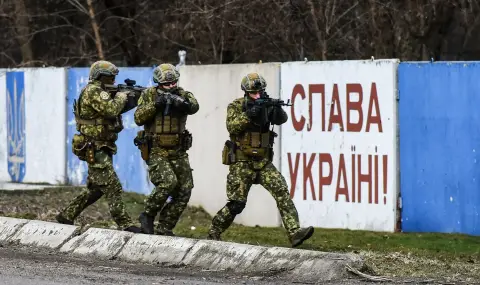A long war of attrition is likely to end in the collapse of Ukraine. The US and other Western countries did not provide Ukraine with weapons to defeat Russia - because of fear of Vladimir Putin's nuclear weapons.
Such a position was expressed to Foreign Affairs by political science professor Jacob Griegel from the Catholic University of America. He was a senior advisor at the Office of Policy Planning at the US State Department from 2017 to 2018.
The United States has hit a wall in Ukraine, he points out. The timid approach of the Joe Biden administration did not work and instead led to a long war of attrition. Ukraine's lackluster performance over the past year has raised the grim prospect of a possible Russian victory that would see Kiev fall under Moscow's imperial rule.
Former President Donald Trump has vowed to change the US approach if he wins the November election, insisting he can end the war “in 24 hours”. That means his administration wants to shift Washington's focus elsewhere (towards China – ed.).
The war must end — and quickly. The answer is not to end all U.S. aid or rush into a deal with Russian President Vladimir Putin. The United States can still avoid a Russian victory. To stop unlimited US spending and preserve Ukraine's independence and security, the United States and its allies must give Kiev one last serious chance to win – expressed not as a return to Ukraine's 2013 borders (as Kiev would prefer), but as a restoration of the 2021 borders.
To make this outcome possible, Washington and other allies must significantly and rapidly improve Ukraine's military posture with a large influx of weapons -- and no restrictions on their use.
No matter who is in the White House, a short-term increase in unlimited military aid offers the best chance for long-term peace in Europe.
The current strategy of the Biden administration is unsustainable for both the United States and Ukraine. In 2022, after Russia attacked and Ukraine showed remarkable determination to fight back, Washington and some of its allies gradually and tentatively began sending military aid to Kiev, placing limits on how and where Ukrainian forces could use the weapons. They feared that a stronger response would trigger a Russian escalation, potentially extending the conflict beyond Ukraine and putting the West at risk.
Putin's nuclear jingle has so horrified American and European officials that they have effectively given Kiev just enough support to keep it from collapsing under Russian attack. The obvious goal is not to defeat Russia on the battlefield. NATO countries did not provide Ukraine with the tools to win.
A long war of attrition is likely to end in the collapse of Ukraine.
Kiev doesn't have enough manpower to send reinforcements into the trenches for years to come. Three-quarters of Ukrainian firms experience labor shortages due to emigration and military service. The agricultural sector has lost fertile land: for some crops, the amount of harvest has decreased by about a third. The loss of ports such as Mariupol has created serious problems for manufacturers looking to export. A report estimated that rebuilding Ukraine's housing, infrastructure and industry would require nearly half a trillion dollars. As time goes by, the situation will only get worse.
Time is also not on the side of Ukraine's Western partners. European countries argue that Russia's war is an existential threat to the continent, but for the most part, their recent military investments have been modest, and they have been reluctant to commit large sums of money to support Ukraine's economy. The countries on the eastern front line of Europe are an exception.
There is no benefit to the United States in financing a protracted conflict. It is also politically unsustainable: as a result of decades of deeply unpopular “perpetual wars”, American leaders can no longer promise indefinite financial outlays and arms supplies based on a strategy with no prospect of success.
Moscow can rely on its military economy and need not negotiate as long as it is confident it can bleed Ukraine into capitulation and outlast Western support for Kiev. And Ukraine also cannot afford to negotiate from its current position, which is not strong.
At the same time, Washington and its partners should not worry too much about provoking Russia. Western fears of Russian escalation are exaggerated. Throughout his tenure, Putin has been careful to avoid direct confrontation with the West, probably aware that Moscow cannot compete economically and militarily with its rivals.
The decisive factor will be the speed and amount of lethal assistance. If Ukraine manages to break through the front line and force a return to the territorial status quo before February 2022, it could hand Russia a clear defeat. Crimea will remain under Russian occupation, but it will also remain a weak point that the Ukrainian military can use to deter Moscow from resuming full-scale war.
Even in the best-case scenario, there is no reason to expect a Russian defeat so dramatic as to fundamentally change Moscow's strategic outlook. Russia will remain a nuclear power, harboring deep aspirations to restore its imperial greatness. But to achieve this goal, it needs Ukraine, which will enable it to threaten the rest of Europe. Without Ukraine, Russia is only an Asian power that is rapidly losing ground to China.
There is no strategic rationale for Washington to prolong the conflict with drop-by-drop supplies. Instead, it is time for the next President of the United States to take decisive action.
